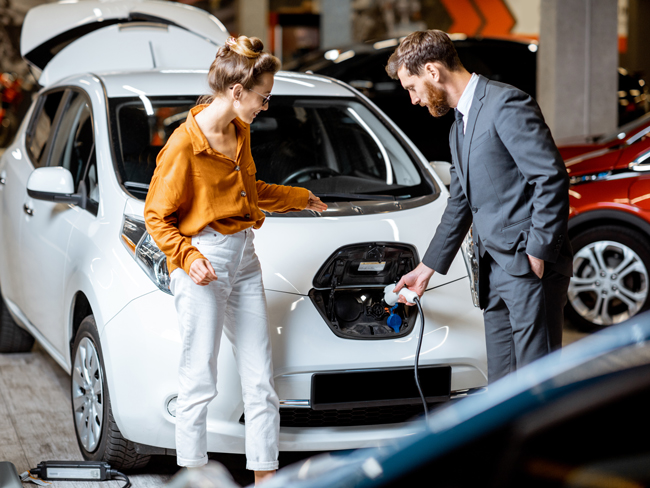We reached out to two general managers of award-winning EV dealerships to better understand the ingredients to their success.

Federal government rebate and incentive programs, which vary in each province, are clearly growing customer demand for electric vehicles (EV) — yet some dealerships feel left out of this booming market.
To better understand how dealerships can best position themselves, no matter their location, we spoke with two general managers of award-winning EV stores in British Columbia and Quebec.
Mandu Goebl, General Manager of Campus Nissan Victoria in B.C., said they were among the first Nissan stores to get into electric vehicles 10 years ago. “Although the people coming in asking for them represented a small market, the EVs were nice and buyers really enjoyed them, so we knew we were on to something,” said Goebl.
Campus Nissan Victoria has been operating for 41 years, has 70 employees, and is part of Campus Auto Group.
We then spoke with Hugo Jeanson, General Manager and Co-owner of Bourgeois Chevrolet Buick GMC. Operating since 1964, this dealership has 55 employees and isn’t part of a dealer group.
Jeanson’s path to bringing Bourgeois into the Canadian Electric Vehicle Awards Hall of Fame started in 2012. A customer came in to exchange a Chevrolet Volt PHEV previously purchased elsewhere. Influenced by hype, he purchased it without understanding the need to charge the battery.
“At first, electric cars were reserved for big centres. Being based in Rawdon — a suburb over an hour away from Montreal — we didn’t have access to EVs. Also, only Volt-accredited franchises could sell them, which we didn’t have,” said Jeanson.
“When we exchanged for the Volt, I tried it; found it drove really well; and started using it for my trips to Montreal instead of my pick-up truck,” he added. “These trips would cost me 100$ a week. With the Volt, that amount dropped to about 20-30$ a month. It gave me great savings, which compelled me to pass them on to our clients.”
Although incentive programs stimulate demand, some changes must be made internally, starting with the dealership’s staff. At the fundamental level, EV sales growth for dealerships boils down to having a team committed to EV product-learning. Mandu Goebl of Campus Nissan Victoria offered his take on this one:
“A dealership has to work hard in training its staff into becoming dedicated EV sales experts. Creating a culture of EV knowledge within the dealership is critical,” said Goebl. “When the EV market comes in, that culture is what makes the customer feel confident in buying the vehicle. (The) next thing they’ll do is recommend it to family and friends. Your EV business will build that way.”
Goebl said their OEM helped them a lot in the beginning through training and having experts come into the dealership. “Afterwards, in addition to our regular sales meetings, we had weekly training sessions for those who wanted to sell EVs. These covered various EV specific topics, situations with customers, or knowledge testing,” said Goebl.
This theme of continuous EV learning — as a team — is a perspective shared by Bourgeois Chevrolet.
“The best way to adopt EVs is to try them. To understand EVs. We’ve become experts by experimenting with EVs in every possible situation: winter, summer, the coast,” said Jeanson. “The considerations that buyers have — well, it’s by driving EVs that you can answer them. The majority of our team has converted to EVs: technicians, accountants, sales representatives and so on. That’s number one; it takes at least one person in each department who fully understands EVs to be able to explain them to buyers.”
Jeanson recommends doing the same for customers.
“What made us successful was our 48-hour trials. We have a fleet of 30 EVs that are used as courtesy vehicles. So, for customers who need an oil change or vehicle maintenance, we lend them an EV while their vehicle is being repaired,” said Jeanson. “Putting the customer directly behind the wheel and letting them try the vehicle will show them how well EVs do the job.
Both dealerships indicate that the pace of the EV market shows no sign of slowing down.
“In Victoria, everybody knows an EV driver. There are so many in the community that only buyers come in — not ICE or EV buyers. Customers look at a gas vehicle and an EV, sometimes, side by side,” said Goebl.
As for Jeanson, he said approximately 50 per cent of their sales are electric cars. “If people choose us as opposed to going to a different dealership, it’s because they want to buy an EV.”
For dealerships that want to grow their EV business, start by asking yourself this question: How well do you know EVs?










